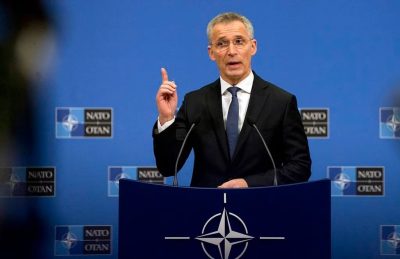Stoltenberg Admits NATO Began Preparing Ukraine for War with Russia Since 2014

All Global Research articles can be read in 51 languages by activating the Translate Website button below the author’s name.
To receive Global Research’s Daily Newsletter (selected articles), click here.
Click the share button above to email/forward this article to your friends and colleagues. Follow us on Instagram and Twitter and subscribe to our Telegram Channel. Feel free to repost and share widely Global Research articles.
***
NATO Secretary General Jens Stoltenberg admitted that the alliance had prepared Ukraine for war with Russia since 2014. At the same time, French Defence Minister Sébastien Lecornu announced on July 12 that the French military has already trained 5,200 Ukrainian troops and plans to train a total of 7,000 troops by year’s end.
“France’s support for Ukraine is not weakening. […] Almost 5,200 Ukrainian soldiers have already been trained by France, including 1,600 in Poland. There will be almost 7,000 by the end of the year,” Lecornu tweeted.
According to Lecornu, Ukrainian troops are learning how to operate French military equipment transferred to them and practice modern combat tactics, such as forming battalions that can manoeuvre as a coherent tactical unit.
Meanwhile, the British government announced that more than 19,000 Ukrainian soldiers had been trained in the country over the past six months and that Ukraine can expect more material support.
“In the past six months, the UK has also expanded its military training programme for Ukrainian recruits. This programme has trained more than 19,000 soldiers to date and training for Ukrainian pilots in the UK will begin this summer,” the British government said in a statement.
The UK, through NATO, also plans to establish a medical rehabilitation centre “to support the recovery and return of soldiers to Ukraine’s lines of defence after being injured in combat.”
“[The British PM announced a] major new tranche of support for Ukraine, including thousands of additional rounds of Challenger 2 ammunition, more than 70 combat and logistics vehicles and a £50m support package for equipment repair,” the statement added.
Although these announcements are recent revelations, NATO training of the Ukrainian military is not new. Stoltenberg said that the Alliance began supporting the Ukrainian military long before the start of the war.
“I welcome the military support that Allies have provided now for months, actually starting back in 2014,” Jens Stoltenberg told a press conference after the first day of the Alliance summit.
The NATO chief had previously confessed that Western military preparations began nine years ago.
“Since 2014 […] NATO has implemented the biggest reinforcement of our collective defence in a generation. With, for the first time in our history, combat ready troops in the eastern part of the Alliance, with higher readiness, with more exercises, and also with more defence spending,” he said on May 24. “So when President Putin launched his full-fledged invasion last year, we were prepared.”
In a joint statement after the first day of the summit in Vilnius, NATO leaders declared that the deepening partnership between China and Russia is contrary to the values and interests of the alliance.
For his part, Russian President Dmitry Peskov said, before referencing NATO as an alliance that is “aggressive in nature,” that Moscow-Beijing relations “have never been aimed against third countries or alliances in any way.”
“It is not an alliance that was conceived, created, and built with the goal of ensuring stability and security. It is an offensive alliance. It is an alliance that breeds instability and aggression,” Peskov said of NATO.
During the NATO summit’s first day, member countries agreed to bring Ukraine closer to the alliance. However, the concrete provisions proposed to achieve this disappointed Ukraine. It was not lost on major outlets, such as the New York Times, that Zelensky criticised NATO’s attitude.
Zelensky regretted in a tweet the “uncertainty” and “weakness” of NATO before the summit even started. “It seems there is no readiness neither to invite Ukraine to NATO nor to make it a member of the Alliance,” the tweet added.
Considering the humiliation Zelensky has experienced for being photographed isolated and alone at the NATO summit while member leaders talked amongst themselves, the Kiev regime should have realised that they are being used as nothing more than pawns in a now failed attempt to weaken and contain Russia.
It is evident that NATO is doing all it can to support Ukraine, short of using member states’ conventional militaries, and will continue with such a policy until at least the end of 2023, as the French and British announcements demonstrate.
Nonetheless, despite this support from France and Britain, Zelensky chastised NATO’s wider admission policy as “absurd,” prompting even UK Secretary of Defence Ben Wallace to highlight that Kiev does not express enough “gratitude” for the support it receives. Yet, this constant humiliation and the complete destruction of its military and economy has not been enough for the Kiev regime to realise that it is nothing more than an expendable proxy for NATO.
*
Note to readers: Please click the share button above. Follow us on Instagram and Twitter and subscribe to our Telegram Channel. Feel free to repost and share widely Global Research articles.
Ahmed Adel is a Cairo-based geopolitics and political economy researcher.
Featured image is from InfoBrics

